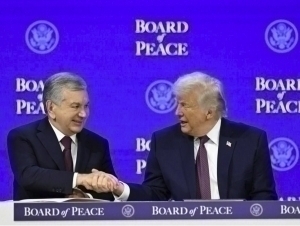Pressure from Trump’s camp: Could Zelensky’s rule soon end?
Review
−
07 March 2025 4458 8 minutes
Trump’s people are in contact with alternative candidates in Ukraine who could potentially replace President Volodymyr Zelensky. Politico first reported this, which was later confirmed by Ukrainian politicians themselves.
The Trump team is said to believe that Zelensky’s power is coming to an end, assuming that the Ukrainian population is tired of the Russian invasion and high levels of corruption. Yulia Tymoshenko and Petro Poroshenko—considered major figures in Ukrainian politics in recent years—have commented on these contacts. However, they did not speak against the current government; on the contrary, they stated that there is no talk of holding presidential elections under occupation and that the issue of possible elections was not raised in their conversations with the US administration. Even so, the Trump administration's negotiations with alternative options for the Ukrainian presidency remain suspicious. Such talk raises numerous questions, especially since it comes after the public dispute between Zelensky and Trump at the White House.
What was discussed?
After the US move was interpreted as a campaign to overthrow Zelensky, Ukrainian opposition leaders insisted that their talks with the White House were not part of any plan to remove the current head of state. Ukrainian opposition leaders confirmed that they had held discussions with Donald Trump’s entourage, but they denied being part of the White House’s plan to remove Volodymyr Zelensky from power.
Former President Petro Poroshenko said he opposed Trump's demand to hold elections during wartime. Poroshenko, who sensationally lost to Zelensky in the 2019 presidential election, stated that the next election should be held only after martial law is lifted. Another politician who has made contact with the US and could be a potential opponent of Zelensky, former Ukrainian Prime Minister Yulia Tymoshenko, echoed Poroshenko’s words, saying that she opposes elections while the invasion is ongoing. According to Tymoshenko, these talks are merely “contacts with allies that help ensure peace.”
According to Politico, these secret discussions took place as part of the White House’s attempt to remove Zelensky from office and involved four senior Trump administration officials. During these discussions, US representatives are said to have raised the issue of whether Ukraine could hold elections soon. In short, they believe that the Ukrainian President will lose the next election. But what is the real situation? Is Zelensky’s power today as weakened as they think? Where and what do the numbers point to?
Are Ukrainians more disappointed than he is?
Some opinions and polls suggest that the new US administration is “taking the piss out of it.” According to the latest data from the British polling firm Survation, Zelensky remains the most popular politician in Ukraine. Even the scandal in the White House, the diplomatic crisis that followed, and Trump’s recent rhetorical attacks on him have worked to his advantage, not his detriment. A recent Survation poll shows that Zelensky’s approval rating stands at 44 percent, which is far higher than the 4 percent rating claimed by sources from the Trump administration. According to the same poll, Poroshenko has 10 percent, and Tymoshenko has 5.4 percent. Another potential candidate, former commander-in-chief of the Ukrainian Armed Forces and current ambassador to the UK Valery Zaluzhny, trails Zelensky by about 20 percentage points, although in previous polls he had scored significantly higher than Zelensky. However, Zaluzhny’s recent actions portray him as not actively seeking power; he has become a fierce critic of the Trump administration, accusing Trump of destroying Western unity and warning of NATO's imminent collapse due to the US’s refusal to meet its European security obligations.
It is noted that the United States has begun negotiations with the weak Ukrainian opposition, and many analysts believe this step will not yield any significant results. Timofey Milovanov, director of the Kyiv School of Economics and former head of the Ministry of Economic Development, Trade and Agriculture, stated that the Trump administration’s talks with Poroshenko and Tymoshenko are clear evidence of their complete ignorance of the situation within Ukraine. According to Milovanov, the main reason US representatives have established contact with Poroshenko and Tymoshenko—despite their very low chances—is that the White House considers them the only candidates among the main contenders for the Ukrainian presidency who are flexible and inclined to compromise with the United States. If Trump wants to overthrow Zelensky, then his only options today are these two candidates.
Some Signals from the US About the Overthrow of Zelensky
Trump representatives are reportedly offering Zelensky an ultimatum: resign if he does not fully support the US plan to end the Russian invasion as soon as possible. It is well known that Trump's desire to seize Ukraine's mineral resources without providing any security guarantees—such as sending troops—is a key component of this plan. Elon Musk, who has famously transformed the Oval Office into what he describes as a "playground" and claims to feel at home on the moon, is also openly advocating for Zelensky to leave power. Musk is confident that once elections are held, Zelensky will be defeated.
Earlier, the Speaker of the US House of Representatives, Mike Johnson, sent a strongly worded message to Zelensky following the recent White House scandal. Johnson warned that the Ukrainian President should “come to his senses and return to the negotiating table with gratitude” or be prepared to hand over power to someone else. He mentioned that the rare earth metals deal between the United States and Ukraine includes security guarantees which, if signed, would offer Ukraine “a certain level of security.” Johnson argued that after the deal is signed, Ukraine will engage in economic cooperation with the US, and Washington will protect its interests and investments. In his view, the real security guarantee for Ukraine is not the presence of US troops, but US investment. Vice President James David Vance echoed this sentiment, stating that “US investment in Ukraine is the strongest security guarantee for official Kyiv, even more so than troops from countries that have not engaged in military action for decades.”
Could Zelensky Fall?
The 2019 presidential election was held in two rounds. In the first round, the new candidate Volodymyr Zelensky, widely known in Ukraine and globally through the TV series “Servant of the People,” won by a twofold margin over former President Petro Poroshenko and advanced as the favorite. In the second round, the gap widened even further: Zelensky secured 72 percent of the vote, a threefold advantage over Poroshenko, and became the country's President. The parliamentary elections that same year were also very successful for him, as his “Servant of the People” party—founded only a year earlier—swept the polls, capturing 235 of the 450 seats in the Verkhovna Rada. This was a crushing defeat for established politicians, including Yulia Tymoshenko and Petro Poroshenko.
Today, the opposition is fragmented: Poroshenko's European Solidarity party holds 27 seats, Tymoshenko's Batkivyna party has 24, and the independent Golos faction, led by Aleksandra Ustinova and in constant dialogue with the US, has only 20 seats in the Verkhovna Rada. Combined, these opposition groups account for less than one-third of the seats held by Zelensky’s “Servant of the People” party.
As for future elections, they were scheduled for 2024, but it is impossible to conduct such a grand political process in a country under occupation. Therefore, in 2023, the Verkhovna Rada adopted a memorandum stating that elections would be held only after the end of the occupation. According to the Constitution, free democratic elections must be held within 180 days of the lifting of martial law, and only then will it be clear whether Zelensky will remain in power.
The current US administration believes that its legitimacy has been seriously damaged by the ongoing occupation and rampant corruption. However, based on Trump’s comments about Zelensky's rating—which he claimed was only 4 percent—the real situation appears to be quite different. Most polls indicate that Zelensky’s popularity remains significantly higher, and although some surveys suggest that his chances are lower than those of former commander-in-chief Valery Zaluzhny, only Zaluzhny currently appears capable of competing with him. Notably, neither Poroshenko nor Tymoshenko seems to be the choice for the Trump administration. Yet, Zelensky still has a good chance of re-election, largely because he did not flee Ukraine at the start of the Russian invasion—a decision that has earned him political asylum in leading Western countries. This factor alone may be sufficient to secure his victory in the next presidential election.
Live
All



